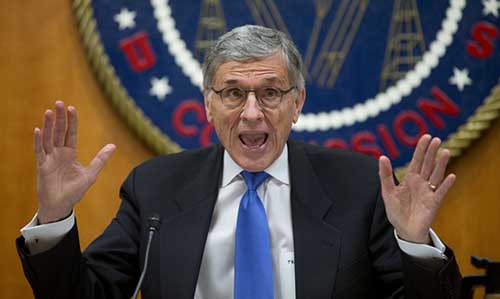Net Neutrality

(FCC Chairman Tom Wheeler has released the net neutrality rules on the agency’s Web site. AP Photo/Pablo Martinez Monsivais).
http://transition.fcc.gov/Daily_Releases/Daily_Business/2015/db0312/FCC-15-24A1.pdf
You can read the statements from Chairman Wheeler and the other FCC Commissioners starting at page 314 of the document, which has been secret until now. I missed a chance to comment- the Commission cut them off last September, and kept the Rule secret until weeks after the deciding vote was taken.
Secret. No kidding. I waded through the executive summary and my head began to hurt. Instead, I saved the whole .pdf-format document to digest in pieces and instead read the 80 pages of supporting and dissenting opinions from the sharply divided Commissioners.
That starts on page 314, and of course the majority got the chance to go first. Fine, that is the way it works.
The funny thing is that the Chairman was ecstatic that the Commission got 3.7 million comments from the great American public, “nearly half of them unique.”
We don’t have to parse that very hard, do we? That means that half the inputs were generated form letters. I have sent such correspondence to our elected fools myself when prompted by advocacy groups I support, not bothering to tailor them to the specific recipient. They are normally produced by some group with a decent mailing list to influence Congressional votes, or proposed rule-making by the Executive Agencies.
That means less than two million citizens actually had something to say that they had thought about before mashing the button.
And of course, what they were commenting on was a request for comment issued early last year which bears nothing like what was voted on last month. I blush to quote one of the minority dissenters, Ajit Pai, on how the process worked:
“Say you and a friend are in Kansas. The two of you have been talking every day for months about how wonderful it would be to visit San Francisco. One day, your friend brings up San Francisco yet again and says “Say, we’ve talked enough about this. I propose we go on a cross-country drive. Do you want to come?” Eager to go west, you say yes. You get in the car, fall asleep for a few hours, and wake up to find that . . . you’re heading east toward Boston! “Wait,” you protest, “I thought we were heading to San Francisco!” Your friend replies: “Well, I proposed merely that we go on a cross-country drive. I know we’d been talking every day for months about San Francisco, but you could have realized that I had Boston in mind.” Deflated, you retort: “But should I have? Shouldn’t you have told me we were heading to Boston and given me a chance to say yes or no before we hit the road?”
But of course, that is how things work, or don’t work in DC these days. Acts that no one reads, titled with names that are the direct opposite of what they do, passed without meaningful debate among those on whom they are imposed.
I was working on the Hill when the Telecommunications Act of 1996 was being formulated. It was a big deal and a lot of money was sloshing around. I had an interest in how the electromagnetic spectrum was going to be divvied up , and had the privilege of escorting Senator Bob Kerry on a trip one time . In the course of the journey he was talking about the Act, and commented that there was “a line of concerned citizens in expensive suits” waiting to get into the hearings about it, since it was the first the first major overhaul of telecommunications law in almost 62 years.
The professed goal of the new law was to let “anyone” enter any communications business, or to let any communications business compete in any market against any other.
I am not smart enough to know if it really worked, but there sure was a lot of money involved in auctioning off things that really didn’t belong to anyone until the Government put a stake on it. The Act had the potential to change the way we work, live and learn. It affected telephone service, local and long distance (remember that?), cable programming and other video services, broadcast services and services provided to schools.
It did not control the Internet, and that is what the 313 pages of the previously secret of the FCC Order on the Internet now does.
The entire Order is premised on the reclassification of broadband Internet access service as a Title II, telecommunications service, and governed by the FCC. I invite you to wade through the whole thing. It is sort of breathtaking, since the sound-bite “Net Neutrality” doesn’t really cover the waterfront of control. None of these Rules follow the guidelines established in previous court decisions, or the guidance of the controlling law passed by Congress in 1996.
In a nutshell, instead of a minimum-level-of-access rule (that would follow the court-ordered existing roadmap), the Order adopts the flat no-blocking rule that the court overturned.
The one thing this guarantees is that a lot of lawyers are going to get rich, and we are going to get hit with all sorts of new taxes- wait, they are just “fees,” so we are not supposed to notice the fine print on the billing statement.
Should the FCC Order survive judicial review, these will be the consequences: higher broadband prices, slower speeds, less broadband deployment, less innovation, and fewer options for American consumers. This plan to regulate the Internet isn’t the solution to a problem. The plan is the problem.
If it were a good thing, it wouldn’t have been such a deep, dark secret.
Copyright 2015 Vic Socotra
www.vicsocotra.com
Twitter: @jayare303
